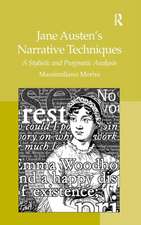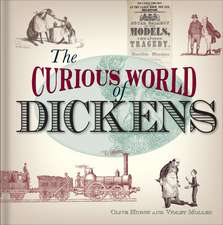Fiction, Famine, and the Rise of Economics in Victorian Britain and Ireland: Cambridge Studies in Nineteenth-Century Literature and Culture, cartea 40
Autor Gordon Bigelowen Limba Engleză Paperback – 29 apr 2007
| Toate formatele și edițiile | Preț | Express |
|---|---|---|
| Paperback (1) | 378.11 lei 6-8 săpt. | |
| Cambridge University Press – 29 apr 2007 | 378.11 lei 6-8 săpt. | |
| Hardback (1) | 696.80 lei 6-8 săpt. | |
| Cambridge University Press – 19 noi 2003 | 696.80 lei 6-8 săpt. |
Din seria Cambridge Studies in Nineteenth-Century Literature and Culture
-
 Preț: 176.74 lei
Preț: 176.74 lei -
 Preț: 177.52 lei
Preț: 177.52 lei -
 Preț: 236.96 lei
Preț: 236.96 lei -
 Preț: 294.81 lei
Preț: 294.81 lei - 9%
 Preț: 627.22 lei
Preț: 627.22 lei - 19%
 Preț: 608.35 lei
Preț: 608.35 lei -
 Preț: 236.78 lei
Preț: 236.78 lei -
 Preț: 447.30 lei
Preț: 447.30 lei - 8%
 Preț: 530.42 lei
Preț: 530.42 lei - 9%
 Preț: 593.58 lei
Preț: 593.58 lei -
 Preț: 237.41 lei
Preț: 237.41 lei - 9%
 Preț: 627.52 lei
Preț: 627.52 lei -
 Preț: 201.59 lei
Preț: 201.59 lei - 11%
 Preț: 697.89 lei
Preț: 697.89 lei - 11%
 Preț: 580.30 lei
Preț: 580.30 lei -
 Preț: 287.28 lei
Preț: 287.28 lei - 9%
 Preț: 592.33 lei
Preț: 592.33 lei - 11%
 Preț: 641.67 lei
Preț: 641.67 lei - 5%
 Preț: 681.46 lei
Preț: 681.46 lei -
 Preț: 202.74 lei
Preț: 202.74 lei - 11%
 Preț: 642.48 lei
Preț: 642.48 lei - 11%
 Preț: 694.58 lei
Preț: 694.58 lei - 11%
 Preț: 584.77 lei
Preț: 584.77 lei - 11%
 Preț: 582.20 lei
Preț: 582.20 lei -
 Preț: 286.42 lei
Preț: 286.42 lei -
 Preț: 317.11 lei
Preț: 317.11 lei -
 Preț: 283.63 lei
Preț: 283.63 lei -
 Preț: 283.03 lei
Preț: 283.03 lei -
 Preț: 296.72 lei
Preț: 296.72 lei -
 Preț: 353.48 lei
Preț: 353.48 lei -
 Preț: 290.16 lei
Preț: 290.16 lei -
 Preț: 286.69 lei
Preț: 286.69 lei -
 Preț: 282.65 lei
Preț: 282.65 lei -
 Preț: 285.54 lei
Preț: 285.54 lei -
 Preț: 326.39 lei
Preț: 326.39 lei - 11%
 Preț: 697.28 lei
Preț: 697.28 lei
Preț: 378.11 lei
Nou
Puncte Express: 567
Preț estimativ în valută:
72.36€ • 78.57$ • 60.78£
72.36€ • 78.57$ • 60.78£
Carte tipărită la comandă
Livrare economică 23 aprilie-07 mai
Preluare comenzi: 021 569.72.76
Specificații
ISBN-13: 9780521035538
ISBN-10: 0521035538
Pagini: 244
Dimensiuni: 154 x 229 x 15 mm
Greutate: 0.36 kg
Editura: Cambridge University Press
Colecția Cambridge University Press
Seria Cambridge Studies in Nineteenth-Century Literature and Culture
Locul publicării:Cambridge, United Kingdom
ISBN-10: 0521035538
Pagini: 244
Dimensiuni: 154 x 229 x 15 mm
Greutate: 0.36 kg
Editura: Cambridge University Press
Colecția Cambridge University Press
Seria Cambridge Studies in Nineteenth-Century Literature and Culture
Locul publicării:Cambridge, United Kingdom
Cuprins
Acknowledgements; Introduction; Part I. Origin Stories and Political Economy, 1740–1870: 1. History as abstraction; 2. Value as signification; Part II. Producing the Consumer: 3. Market indicators: banking and housekeeping in Bleak House; 4. Esoteric solutions: Ireland and the colonial critique of political economy; 5. Toward a social theory of wealth: three novels by Elizabeth Gaskell; Conclusion; Notes; Bibliography; Index.
Recenzii
"...a clearly argued work which brings the industrial novels of Dickens and Gaskell into dialogue with contemporary theories of political economy. The value of Bigelow's book lies primarily in his demonstration of his thesis through a meticulous examination of the language of economic theorists." Kate Flint, Studies in English Literature
"In 1884, Arnold Toynbee described the debate between advocates of culture and political economy as "a bitter argument between economists and human beings." Gordon Bigelow's excellent study traces the result of this argument, analyzing the transformation of economics in the nineteenth century, from being accepted as a social discourse integral to politics and literature to being rejected as a cultural pariah and perpetrator of genocide to being relegated to scientific objectivity in the 1870s to cleanse economics of political associations linking it to catastrophic events such as the Great Famine." Working, Melissa Fegan, University College Chester
"Powerful." EH-NET
"In 1884, Arnold Toynbee described the debate between advocates of culture and political economy as "a bitter argument between economists and human beings." Gordon Bigelow's excellent study traces the result of this argument, analyzing the transformation of economics in the nineteenth century, from being accepted as a social discourse integral to politics and literature to being rejected as a cultural pariah and perpetrator of genocide to being relegated to scientific objectivity in the 1870s to cleanse economics of political associations linking it to catastrophic events such as the Great Famine." Working, Melissa Fegan, University College Chester
"Powerful." EH-NET
Notă biografică
Descriere
How fiction influenced the movement from old ideas of political economy to modern concepts of capitalism.















